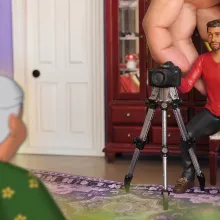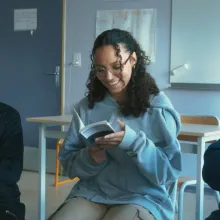Good Pitch makes its Latin American debut.
Latinx Media
In this interview, Efraín Mojica and Rebecca Zweig talk about their years-long collaboration on their queer rodeo hybrid doc Jaripeo
In this interview, TheyDream director William David Caballero talks about his Sundance-premiering doc and his decade-long project of documenting his
Watch the trailer for Diego Gutiérrez’s latest feature, a hopeful-minded travelogue through Mexico centered on the stories that bind its people
At this year’s edition, the Basque festival demonstrated why it prides itself on its political conscience, with many of its titles exploring
Amid the U.S. festival’s commercial wrappings, three docs from rising filmmakers plumb the depths of American inequity
Venice’s robust nonfiction selection revealed filmmakers grappling with inheritance—of land, literature, trauma, and the weight of documenting lives
Close to the start of her hypnotic documentary The Memory of Butterflies, director Tatiana Fuentes Sadowski describes the moment that inspired the film. While looking through a selection of propaganda images taken by a company operating in the Amazon during the late 19th-century rubber boom, Sadowski came across a posed portrait of two young Indigenous men. In the image, the pair stands hand in hand dressed in Western clothes, stiff suits and ties, gazing at the camera with solemn, unreadable expressions: Omarino and Aredomi. Documentary spoke to Sadowski shortly after the film’s premiere at the Berlinale, where the documentary jury awarded the film a special mention, about the ethics of colonial archive, cinematic speculation, and sound as a threshold. This interview has been edited for length and clarity.
Isabel Castro’s sophomore feature centers the family band that catapulted Mexican American singer Selena into pop stardom. Given voice as never before through “hundreds, potentially thousands” of hours of archival footage, Selena Quintanilla constantly gushes about her band—sister Suzette on drums, brother A.B. on bass/producing duties, eventual husband Chris on guitar, and parents Marcella and Abraham as just about everything in between—as the key to her fame. I spoke with Castro a week before her film’s Park City debut, which was yesterday. We discuss the herculean process of combing through the Quintanillas’ archives, paying homage to Gregory Nava’s 1997 biopic and the filmmaker’s favorite Selena song.
State restrictions in Cuba have turned independent filmmaking into a challenge, but with Chronicles of the Absurd, Miguel Coyula and Lynn Cruz show that where there’s a will, there’s a way. Coyula, the director, uses clandestine recordings of Cruz and others in encounters with authorities inside Cuba, whether when trying to hold a screening, or when asking evasive hospital staff for information about her father’s sudden decline in health. Instead of relying on video or explanatory interviews, Coyula lets the riveting audio tell the story, augmented with speakers’ avatars, text, stills of Cruz, and a little animation, plus music ranging from Cuban classical composer Ignacio Cervantes to the punk rock band Porno Para Ricardo. After its world premiere at IDFA, Chronicles of the Absurd was awarded the Best Film in the Envision Competition. Earlier in the festival, I spoke to Coyula and Cruz earlier in their first interview about the film.














